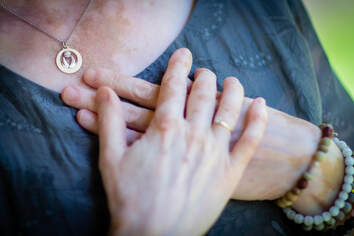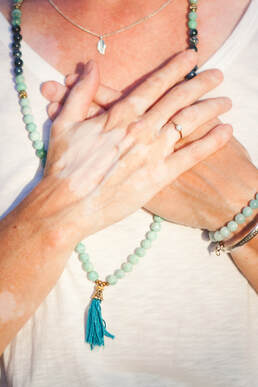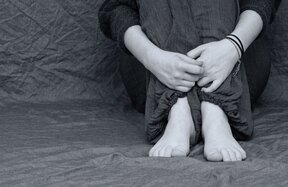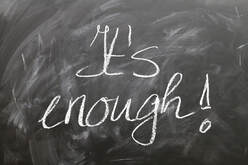 Photo by Renee Veniskey - https://immaginephoto.com
Photo by Renee Veniskey - https://immaginephoto.com
To me it means getting solid in the core of who you are. Knowing yourself - your likes and dislikes, your desires, and your needs - so that you can honor them. It sounds simple, yet it seems there’s a disconnect that happens over time that takes us away from the core of who we are.
This disconnect happens for a lot of reasons. As children and young adults, we take in messages from others about who they think we are or who we’re supposed to be; parents, teachers, friends, coaches see something in us and push us in a certain direction. On the flip side, there are parts of us we’re encouraged to hide away - we’re too sensitive, too talkative, too energetic, too quiet, too eccentric, etc. We begin to show up as a mix of who we really are, who we think we’re supposed to be, while erasing parts of us that don’t feel lovable or welcome.
As we get older, our roles as spouse or parent add to the confusion. We’re just Nicky’s mom or Joe’s wife. Our career defines us and may box us in with its labels. Societal ideas tell us what’s acceptable behavior (e.g., no crying in the workplace). Over time, parts of our true self get covered over, whittled away, or buried.
Intense relationships or situations, like loving someone with a mental health condition, facing a scary diagnosis, or caring for a parent with dementia, may consume us and portray the entirety of who we are. We forget or lose touch with who we are beyond this one (huge) aspect of life. We forget the person we once were and we let go of the dreams and passions that once called to us. Perhaps they feel irrelevant in the urgency of crisis after crisis or they feel impractical given everything else on your plate. Understandable.
Without the time and space to step away and gain perspective on these aspects of life, it’s easy to continue on autopilot. In our new norm, we become defined and absorbed by this identity. Or we’re simply sleep-walking through our days with no real sense of self at all, responding to the needs and demands of others, while ours vanish into the ethers.
I’ve found contemplative, reflective time and space are the foundation for one’s return to self. Time for quiet, to sit with ourselves without the interruption of other voices, time to journal or meditate. Time to commune with trees and birds. Time to slow down and soften into the flow of our natural rhythm. Time to catch our breath and then breathe fully on a regular basis. This time, this space is a rare gift. It is the essential container for coming back into alignment with true self. It allows us to open to the quiet loving voice within.
How retreats play in:
The richness of this kind of time and space is one of the reasons I value retreats. I know they are so much more than simply a nice weekend getaway. Retreats are a vital opportunity to refill, refuel, and reconnect. They offer the chance to ask great questions while allowing the answers to come. They provide space to try new things and new ways of being as you get to know yourself more intimately. They create a container as well as a spaciousness for inner inquiry, exploration, and discovery so that we can feel clarity and strength grow within us. Retreats allow us to be in community with others on a similar quest, sharing practices like yoga, meditation, contemplation, and reflection. Almost always they also offer a chance to immerse ourselves in nature’s beauty and grounding, to be held by the trees and the land as we feel our place in the greater scheme of life along with our own smallness.
These past few months have been filled with intensity and crisis upon crisis, both personally and on a global scale. I’ve had to pull back from work I love as I found myself with little to no energy for anything beyond the basics. I felt myself going into a dark cocoon to dissolve into goo before coming through the other side. In the darkness, I felt myself disappearing, not at all sure when I would re-emerge. I am grateful to feel the re-emergence happening now, slowly, one baby step at a time.
I am grateful for what is being left behind in the shell of the cocoon. I am grateful for the clarity of what no longer fits in this chapter of my life. And I am struck to see how the work I’ve done over the years to build a strong inner core connection has held me, even when I didn’t feel it in the moment. Feeling the foundation that’s allowed me to move through these deeply disruptive and triggering events, I see that they have moved through me as well. Sitting in the darkness, I have let myself feel everything from nothingness to fear to anger and disappointment. I have been taken down and out temporarily, but not for good. I am emerging, not into certainty of what will happen in my life, but with a stronger sense of certainty of who I am as a woman in the world right now.
This period of losing myself in other people’s emergencies and urgencies and feeling the slow return has illuminated my desire to prepare and plan this July’s Come Home to Yourself Retreat. Its significance fills me and pulls me. I am grateful to be able to invite other women into this spacious retreat as an opportunity to connect more deeply with their own hearts and souls, to hear the wisdom that springs from within in the space and stillness, when we are inclined to listen. Summer gifts us 16 hours of daylight each day! Imagine what is possible in that vast opening! Light on the Hill offers a stunning space to immerse in nature, with floor to ceiling windows and skylights that all but plop us into the middle of the valley, sun streaming in, bathing us in her glow. This season in the Finger Lakes calls us to lie in the grass, to walk through the trees, to gaze at the clouds, to stop in the middle of what can be a fun and busy season to slow down and go within. It gives us a chance to integrate the lessons life has brought our way as we simultaneously open to what lies ahead, to what is emerging, and to who we want to be. This retreat is a gift to me and to all who will gather and co-create it along with me and our yoga goddess, Carol Moon.
A special offer for you:
For you and your loved ones, for being part of this community, I am offering a special gift through March 31st - you can take an additional $50 off the early bird rate ($150 off standard rate) as my gift to you by using coupon code MARCH when you check out. That’s $625 for 3 nights and 4 days of private room accommodations in a gorgeous setting, delicious, lovingly prepared vegetarian meals, as well as all retreat offerings (including yoga, meditation, journaling, campfires plus lots and lots of space and time to follow your heart and soul!). I hope you will consider joining us for what will surely be a magical time. All the details and registration are here.












 RSS Feed
RSS Feed